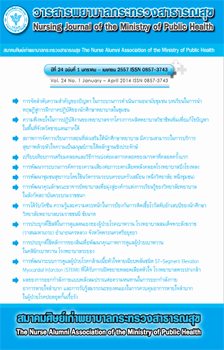การพัฒนาชุมชนสุขภาวะโดยใช้นวัตกรรมระบบครอบครัวเสมือน (หนึ่งวิทยาลัย หนึ่งชุมชน)
Main Article Content
Abstract
การวิจัยเรื่องนี้เป็นการขยายขอบเขตการศึกษาว่า “นวัตกรรมระบบครอบครัวเสมือน” หรือ “รูปแบบ การจัดการเรียนการสอนแบบบูรณาการใหม่ที่ได้พัฒนาและเริ่มนำมาใช้นับตั้งแต่ปี พ.ศ. 2551 เพื่อพัฒนา นักศึกษาอย่างองค์รวม คือ เป็นคนดี เก่งและมีความสุข” นั้น สามารถนำไปประยุกต์ใช้เพื่อพัฒนาชุมชนสุขภาวะได้ อย่างไร ดังนั้น งานวิจัยจึงมีวัตถุประสงค์เพื่อศึกษา “รูปแบบการพัฒนาชุมชนสุขภาวะ โดยใช้ระบบครอบครัว เสมือน (หนึ่งวิทยาลัย หนึ่งชุมชน)” ของกลุ่มวิทยาลัยพยาบาล ในสังกัดสถาบันพระบรมราชชนก ใช้การวิจัยเชิง บรรยายและการวิเคราะห์เนื้อหาโดยมีกลุ่มเป้าหมายในการศึกษา คือ วิทยาลัยในสังกัดสถาบันพระบรมราชชนก สำนักงานปลัดกระทรวงสาธารณสุข กระทรวงสาธารณสุข จำนวน 3 แห่ง อันได้แก่ วิทยาลัยพยาบาล บรมราชชนนี ขอนแก่น, วิทยาลัยพยาบาลบรมราชชนนี จักรีรัช และวิทยาลัยพยาบาลบรมราชชนนี นครศรีธรรมราช โดยวิเคราะห์จากรูปแบบการสร้างความมีส่วนร่วมระหว่างวิทยาลัยและชุมชนเป้าหมาย อันจะ นำไปสู่ 1) การพัฒนาเสริมสร้างสุขภาวะทางร่างกายของบุคลากรในองค์กรและชุมชนภายนอก 2) การพัฒนา วิทยาลัยให้กลายเป็นชุมชนแห่งการเรียนรู้ร่วมกับชุมชนภายนอก 3) การพัฒนาอัตลักษณ์จิตบริการด้วยหัวใจ ความเป็นมนุษย์ให้เกิดกับนักศึกษาของวิทยาลัยฯและคนในชุมชนภายนอก และ 4) การบูรณาการพัฒนาสุขภาวะ ในด้านร่างกาย จิตใจ จิตวิญญาณ/สติปัญญาอย่างเป็นองค์รวม
ผลการวิจัยพบว่า ทั้ง 3 วิทยาลัยได้พัฒนาความสัมพันธ์กับชุมชนเหล่านั้นเสมือนญาติที่อยู่ในครอบครัว เดียวกันกับวิทยาลัย ร่วมกันวางแนวทางการพัฒนาชุมชนสุขภาวะเพื่อให้เกิดการเรียนรู้อย่างมีส่วนร่วม พร้อมกัน กับ การดูแลประชาชนในชุมชนเป้าหมาย โดยจัดทำพันธะสัญญาร่วมกันระหว่างวิทยาลัยแต่ละแห่งกับชุมชนเพื่อ ให้การดำเนินกิจกรรมเป็นไปอย่างเหมาะสมสอดคล้องกับภูมิสังคม โดยใช้กระบวนการเรียนรู้จิตบริการด้วยหัวใจ ความเป็นมนุษย์ภายใต้นวัตกรรมระบบครอบครัวเสมือน ในการสร้างการมีส่วนร่วมระหว่างวิทยาลัยและชุมชนอัน จะนำไปสู่การพัฒนาชุมชนสุขภาวะ
The Development of Well-being under the Innovation of Simulated Family System (One College One Community)
Somkuan Hanpaichaiyakul*
Makarapan Jutarosaga**
Lily Siliporn***
Abstract
This research explored the application of ‘Simulated Family System’ on the development of well-being under participation between colleges and their local communities. Since 2008, the innovative integrated education model, dubbed as ‘Simulated Family System’, has been adopted as one of the teaching and instructional methods by the selected nursing colleges to promote the three desirable qualities of nursing students (goodness, competence and happiness). Therefore, the main objective of this research was to investigate the development of well-being under the innovation of Simulated Family System by selected nursing colleges under the Praboromarajchanok Institute for Health Workforce Development, Ministry of Public Health. Descriptive research and content analysis were used to investigate each of the models developed by the selected nursing colleges, including Boromarajonani College of Nursing, Khon Kaen; Boromarajonani College of Nursing, Chakriraj; Boromarajonani College of Nursing, Nakhon Si Thammarat. The analysis focused on existing models that have developed to encourage the participation between colleges and their communities to attain the desirable well-beings as follows: 1) the betterment of physical well-being of human resources within the colleges and those in the local community, 2) the formation of learning communities between colleges and local communities, 3) the nurture of ‘humanized health care’, as a desirable mental quality for both groups, and 4) the integrated development of holistic well-being.
The results revealed that all 3 colleges developed family-like relationships with communities, and co-planned with the community to attain the desirable well-being of the community, leading to participatory learning while taking care of target people. The activities were created based on the community context under the contact between the nursing college and the community. The application of ‘Simulated Family System’ and humanistic learning process encouraged the participation between the nursing colleges and their communities to attain the desirable well-being of the community.
* Former director of Praboromarajchanok Institute (B.E.2551-2556), A Chief of Chaiyabhum Provincial Health Office
** Former director of Boromarajonani College of Nursing, Khonkhan (B.E.2551-2555)
*** Deputy director of Praboromarajchanok InstituteArticle Details
บทความและรายงานวิจัยในวารสารพยาบาลกระทรวงสาธารณสุข เป็นความคิดเห็นของ ผู้เขียน มิใช่ของคณะผู้จัดทำ และมิใช่ความรับผิดชอบของสมาคมศิษย์เก่าพยาบาลกระทรวงสาธารณสุข ซึ่งสามารถนำไปอ้างอิงได้
